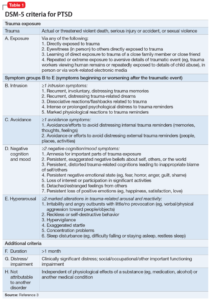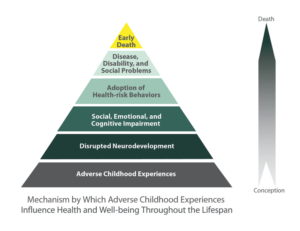The word “trauma” is used widely today to refer to an experience that is damaging to a person’s psychological health, and as we’ve mentioned in previous articles, the magnitude of this experience is completely dependent on the individual. What most people outside of the behavioral health profession don’t know is that trauma can be categorized into two classifications: what are known as “Big T” and “Little T.”
BIG T TRAUMA
In general, the Big T variation of trauma refers to a single, traumatic event that can leave a survivor of the event with symptoms associated with Post Traumatic Stress Disorder, or PTSD. Experiences like sexual assault, serious injuries, violent attacks, and near-death experiences all fall under this category, and it’s now widely understood what kind of impact Big T trauma can have on a person’s life. People coping with the effects of a traumatic event, and may be suffering from PTSD, experience various symptoms including:
| Re-experiencing |
|
| Avoidance |
|
| Arousal and reactivity |
|
| Cognition and mood |
|
Adapted from National Institute of Mental Health (NIMH)
POST TRAUMATIC STRESS DISORDER (PTSD)
Given the general public knowledge of trauma, you might find it surprising that it wasn’t until 1980 that the American Psychiatric Association recognized PTSD as a clinical diagnosis, when they added it to the Diagnostic and Statistical Manual of Mental Disorders (DSM-III). According to the U.S. Department of Veterans Affairs, the diagnosis was both controversial and groundbreaking as it suggested for the first time that the cause, “was outside the individual (i.e., a traumatic event) rather than an inherent individual weakness (i.e., a traumatic neurosis)”. The introduction, research and development of the PTSD diagnosis has paved the way for more trauma-informed and trauma-focused care. You can read the latest criteria for diagnosing PTSD in the DSM-V below.

LITTLE T TRAUMA
Little T trauma is a very different thing though, because it includes virtually every other adverse life experience — each hardship and struggle that people deal with throughout life — that doesn’t fall under the Big T umbrella. Whether it’s a case of bullying, loss of friends or family members, or an emotionally abusive relationship, Little T trauma tends to be the tough situations that many people deal with on a daily basis that don’t necessarily result in a clear diagnosis of a lasting effect. Because trauma is subjective and depends entirely on a person’s resilience and perception, adverse life experiences include anything that could potentially result in trauma; not only the presence of a negative experience, but also the absence of a positive one.
Trauma is anything short of love.
-Unknown
Everyone handles trauma (in either variety) in different ways, and there is now a fairly prevalent belief — and the scientific backing to prove — that dealing with repeated Little T trauma can be just as significant as a single occurrence of its Big T counterpart. Much like experiencing a traumatic life event such as a natural disaster or surviving a serious car crash, experiencing repeated events that engage the body’s stress response system can alter the neural network, especially when these experiences take place in early childhood.
ADVERSE CHILDHOOD EXPERIENCES (ACE) STUDY
Thanks to a study conducted by the CDC and Kaiser Permanente Health in the late 90s, we now know the impact the Adverse Childhood Experiences, or ACEs, have on a person’s neurodevelopment and social-emotional-cognitive development, and as a result, their later in life health outcomes. In the ACE Study, seven categories of adverse childhood experiences were studied: psychological, physical, or sexual abuse; violence against mother; or living with household members who were substance abusers, mentally ill or suicidal, or ever imprisoned.

What the study found was that a person with a higher ACE score was at significantly higher risk for substance abuse, mental health issues, intimate partner violence, and a host of health issues. Before the study was conducted and accepted by the medical and behavioral health community, these experiences that know refer to as adverse life events, adverse childhood experiences or Little T trauma, had been considered a normal part of life. Much like combat veterans returning home from war and being shamed or dismissed as being weak are now being treated for PTSD, these seemingly common but potentially damaging experiences are starting to garner the attention, empathy, or treatment that a Big T survivor might receive.
WHY ARE THESE IMPORTANT?
As mentioned above and in previous articles, exposure to trauma — whether it be Little T or Big T — can cause psychological (and sometimes physical) pain that often leads to destructive coping mechanisms, behavioral adaptations and health-risk behaviors. As a means to escape or numb the pain endured during the trauma, and the recurring discomfort that follows, survivors often turn to self-medicating with controlled substances. As with many addictions, it then becomes a vicious cycle that is generally only broken through proper trauma-focused treatment.
In all likelihood, every person will deal with some type of Little T trauma in their lifetime, and many will be no worse for the wear. But now that it has become recognized as a legitimate cause of maladaptive behaviors that can lead to mental health and substance use disorders, it can finally be treated and viewed on an even playing field with its “bigger” sibling.
Resources:
https://www.ajpmonline.org/article/S0749-3797(98)00017-8/abstract
https://www.cdc.gov/violenceprevention/childabuseandneglect/acestudy/about.html
https://www.sciencedirect.com/science/article/pii/S2352289516300273
https://www.nimh.nih.gov/health/publications/post-traumatic-stress-disorder-ptsd/index.shtml#pub3
https://www.ptsd.va.gov/professional/treat/essentials/history_ptsd.asp



